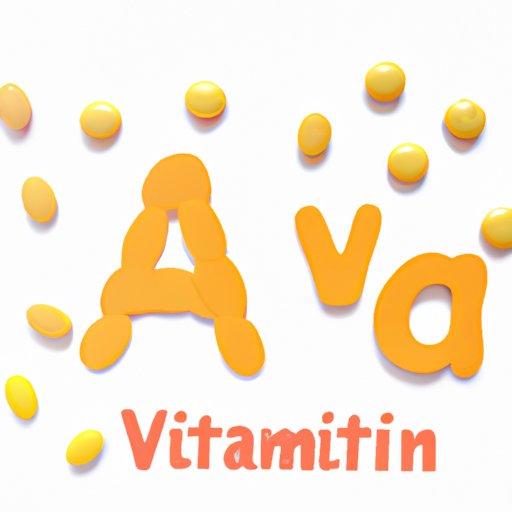
Introduction
Vitamin A is an essential nutrient that plays a crucial role in maintaining various aspects of our health. From supporting our immune system to promoting healthy vision, this nutrient is necessary for our bodies to function properly. In this article, we will take a closer look at what Vitamin A does for our bodies and how we can incorporate more of it into our diets to promote overall wellness.
Unlocking the Benefits of Vitamin A for a Healthier, Stronger You
Vitamin A is a fat-soluble vitamin that is essential for healthy vision, reproduction, and immune system function. There are two types of Vitamin A: retinoids, which are found in animal products, and carotenoids, which are found in plant-based foods. Both forms of Vitamin A are converted into retinol, the active form of the vitamin that our bodies can utilize.
Why Your Body Needs Vitamin A and How to Get More of It Naturally
Vitamin A is essential for various functions within the body, including:
- Promoting healthy vision
- Strengthening the immune system
- Promoting healthy skin, hair, and nails
- Supporting growth and development
- Promoting healthy reproduction and fertility
Some of the best food sources of Vitamin A include liver, fish, dairy products, and eggs. Plant-based sources of Vitamin A include sweet potatoes, carrots, spinach, and kale. To incorporate more of this nutrient into your diet, try adding these foods to your meals or snacks.
It’s important to note that consuming too much Vitamin A can be toxic, so it’s essential to consume this nutrient in moderation. The recommended dietary allowance (RDA) for Vitamin A varies based on age and gender, but it generally ranges between 700-900 micrograms per day for adults.
From Clearer Vision to Stronger Immunity: How Vitamin A Supports Your Overall Health
Vitamin A plays a crucial role in maintaining various aspects of our health. Here are some of the key benefits of this essential nutrient:
- Promotes healthy vision: Vitamin A is essential for maintaining good eyesight, and a deficiency in this vitamin can lead to night blindness and other vision problems.
- Strengthens the immune system: Vitamin A helps to boost our immunity by promoting the growth and development of lymphocytes, white blood cells that help to fight off infections.
- Promotes healthy skin, hair, and nails: Vitamin A promotes healthy skin by aiding in the production of collagen, a protein that is essential for maintaining healthy skin, hair, and nails.
- Supports growth and development: Vitamin A is necessary for the growth and development of cells and tissues within the body, making it especially important for children and adolescents.
- Promotes healthy reproduction and fertility: Vitamin A is essential for healthy reproduction, as it plays a key role in the development and function of reproductive organs.
Vitamin A: The Key Nutrient for Skin, Hair, and Nail Health
Vitamin A plays a crucial role in maintaining healthy skin, hair, and nails. This essential nutrient helps to promote healthy skin by aiding in the production of collagen, a protein that is essential for maintaining skin elasticity and preventing wrinkles. Vitamin A also helps to regulate oil production within the skin, which can help to prevent acne and other skin conditions.
A deficiency in Vitamin A can also impact the health of our skin, hair, and nails. Without enough of this nutrient, our skin can become dry, rough, and susceptible to damage. Our hair can become dry and brittle, and our nails can become weak and brittle as well. To maintain healthy skin, hair, and nails, it’s essential to consume enough Vitamin A through our diets.
The Science Behind the Key Role of Vitamin A in Maintaining a Healthy Pregnancy
Vitamin A is especially important for pregnant women and their developing fetuses. This essential nutrient plays a key role in the development of fetal organs, including the heart, lungs, and kidneys. Vitamin A also helps to promote healthy immune function, which can help to protect both the mother and fetus from infections.
However, it’s important to note that consuming too much Vitamin A during pregnancy can be harmful. High levels of this nutrient can increase the risk of birth defects and other complications. Pregnant women should consume Vitamin A in moderation, and talk to their healthcare provider about the appropriate dosage for their needs.
Maximizing Your Vitamin A Intake: Tips and Tricks for Better Absorption and Utilization
To maximize the absorption and utilization of Vitamin A, it’s important to consume this nutrient alongside healthy fats. This is because Vitamin A is a fat-soluble vitamin, which means that it needs to be consumed alongside dietary fat in order to be properly absorbed and utilized by the body. Consuming Vitamin A alongside healthy fats such as avocado, nuts, and seeds can help to optimize the nutrient’s absorption.
It’s also important to be aware of common medicines and supplements that can interfere with Vitamin A absorption. Some common medications that can interfere with this nutrient include cholesterol-lowering drugs, mineral oil, and certain acne medications. If you are taking any medications or supplements, talk to your healthcare provider about how they may impact your Vitamin A intake.
Conclusion
Vitamin A is an essential nutrient that plays a key role in maintaining various aspects of our health. From promoting healthy vision to supporting a healthy pregnancy, this nutrient is necessary for our bodies to function properly. By incorporating more Vitamin A-rich foods into our diets and being mindful of absorption and utilization, we can prioritize this nutrient and support our overall wellbeing.





